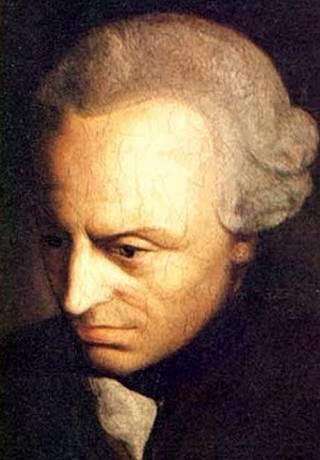Immanuel Kant

イマヌエル・カント(1724年~1804年)
ドイツの哲学者。ドイツ古典主義哲学(ドイツ観念論哲学)の祖とされる。
1724年4月22日、東プロイセンの首都ケーニヒスベルクの馬具職人の四男として生まれる。
両親はルター派の敬虔主義を奉じていたため、イマヌエル・カントもその濃厚な影響のもとに育つ。
16歳のときにケーニヒスベルク大学に入学。神学を志していたが、ニュートン(1642~1727)の活躍などで発展を遂げつつあった自然学に関心が向かい、哲学教授の影響のもと、自然学を研究した。
22歳のときに父が死去。学費が続かなくなったカントは大学を去る。その後の7年間は生活も苦しく、家庭教師をして生計をたてていた。
31歳のとき、カントは最初の論文で太陽系は星雲から生成されたと論証。また、ケーニヒスベルク大学哲学部に学位論文を提出し、学位を取得。同大学の私講師として職業的哲学者の生活に入る。
46歳のときにケーニヒスベルク大学から哲学教授としての招聘があり、カントは引退までこの職にとどまった。
1781年、57歳のときに『純粋理性批判』を発表。その難解さと斬新な思想のために同時代の読者に正しく理解されず、さまざまな議論が起こり、カントはドイツ哲学界の喧騒にみちた論争の渦中に入り込んだ。
続いて1788年に『実践理性批判』、1790年に『判断力批判』を発表。これらを総称し「三批判書」と呼ぶ。
カントは哲学的論争の渦中にいたがその学者人生は順調であり、晩年にはケーニヒスベルク大学総長を務めた。しかし、プロイセン王立ベルリン・アカデミーには招聘されなかった。
1804年2月12日、カントは79年の生涯を閉じた。
名言
To be is to do.
存在するとは、行動することである。
Immaturity is the incapacity to use one’s intelligence without the guidance of another.
未熟さとは、他人の指導なしでは自分の知性を使うことができないということである。
It is not necessary that whilst I live I live happily; but it is necessary that so long as I live I should live honourably.
わたしが生きている間、ずっと幸せである必要はない。しかし、生きている限りは立派に生きるべきである。
Ingratitude is the essence of vileness.
恩知らずとは、卑劣さの本質だ。
Religion is the recognition of all our duties as divine commands.
宗教とは、我々の義務のすべてを神の命令とみなすことである。
Experience without theory is blind, but theory without experience is mere intellectual play.
理論のない経験は盲目である。しかし、経験のない理論は単なる知的ゲームに過ぎないのだ。
Beneficence is a duty.
善行は義務です。
1) What can I know?
2) What ought I to do?
3) What may I hope?
4) What is man?
The first question is answered by metaphysics,
the second by morality,
the third by religion,
and the fourth by anthropology.
At bottom all this could be reckoned to be anthropology, because the first three questions are related to the last.
1.私は何を知りうるか。
2.私は何を為すべきか。
3.私は何を望むのがよいか。
4.人間とは何か。
第一の問いに答えるのは形而上学であり、
第二の問いには道徳、
第三の問いには宗教、
第四の問いには人間学が答える。
結局これらすべては人間学に含ませてよいであろう。なぜなら最初の三つの問いは最後の問いに関連しているからだ。
Science is organized knowledge. Wisdom is organized life.
科学とは体系化された知識で、知恵とは整理された生活である。
The death of dogma is the birth of morality.
ドグマ(独断的な説)の死は、道徳の誕生だ。
We cannot learn philosophy. We can only learn to philosophize.
哲学は学べない。学べるのは哲学することだけである。
Happiness is not an ideal of reason but of imagination.
幸福とは理性の理想ではなく、想像の理想である。
Look closely. The beautiful may be small.
よく見なさい。美とは取るに足りないものかもしれない。
If man makes himself a worm he must not complain when he is trodden on.
もし虫けらのように振る舞うのならば、踏み付けられても文句を言ってはならない。
In law a man is guilty when he violates the rights of others. In ethics he is guilty if he only thinks of doing so.
法律においては、他人の権利を侵害する時には罰せられる。道徳においては、侵害しようと考えるだけで罪である。
He who is cruel to animals becomes hard also in his dealings with men. We can judge the heart of a man by his treatment of animals.
動物に対して残酷な人は、人間関係においても容赦ない。我々は動物の扱い方によって、その人の心を判断することができる。
That all our knowledge begins with experience there can be no doubt.
すべての知識は経験に基づく。
Live your life as though your every act were to become a universal law.
自分の一つ一つの行為が普遍的法則になるかのように生きるのだ。
Two things fill the mind with ever-increasing wonder and awe, the more often and the more intensely the mind of thought is drawn to them: the starry heavens above me and the moral law within me.
何度も繰り返し長い時間をかけて考えれば考えるほど、いつも新たな、いよいよ強い感嘆と畏敬とで心をみたすものが二つある。私の上なる星空と私の内なる道徳法則とである。
Thoughts without content are empty, intuitions without concepts are blind.
内容のない思考は空虚であり、概念のない直観は盲目である。
I had therefore to remove knowledge, in order to make room for belief.
信念のための場所をつくるために、わたしは知識を取り除く必要があった。